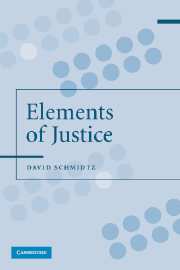Book contents
- Frontmatter
- Contents
- Acknowledgments
- PART 1 WHAT IS JUSTICE?
- PART 2 HOW TO DESERVE
- PART 3 HOW TO RECIPROCATE
- PART 4 EQUAL RESPECT AND EQUAL SHARES
- PART 5 MEDITATIONS ON NEED
- PART 6 THE RIGHT TO DISTRIBUTE
- 30 Intellectual Debts
- 31 Rawls
- 32 Nozick
- 33 Rectification
- 34 Two Kinds of Arbitrary
- 35 Procedural versus Distributive Justice
- References
- Index
31 - Rawls
Published online by Cambridge University Press: 05 June 2012
- Frontmatter
- Contents
- Acknowledgments
- PART 1 WHAT IS JUSTICE?
- PART 2 HOW TO DESERVE
- PART 3 HOW TO RECIPROCATE
- PART 4 EQUAL RESPECT AND EQUAL SHARES
- PART 5 MEDITATIONS ON NEED
- PART 6 THE RIGHT TO DISTRIBUTE
- 30 Intellectual Debts
- 31 Rawls
- 32 Nozick
- 33 Rectification
- 34 Two Kinds of Arbitrary
- 35 Procedural versus Distributive Justice
- References
- Index
Summary
Thesis: Rawls's way of doing philosophy – his sense of what counts as an argument – is unlike mine. Yet Rawls moved the discipline forward. He made progress.
AN ALTERNATIVE TO UTILITARIANISM
According to Rawls, we should think of society as a cooperative venture for mutual advantage. Cooperation enables us all to flourish, but we each want a larger share of cooperation's fruits, so cooperation inevitably involves conflict. One way to resolve the conflict is to distribute the fruits to maximize overall utility. Yet this proposal fails to acknowledge that individuals entering into cooperative ventures are separate persons contributing to those ventures in pursuit of their own legitimate hopes and dreams. Failing to respect their separate projects and contributions is unjust. It may be the fundamental injustice.
Standard forms of utilitarianism allow – indeed require – sacrificing the few for the sake of the many (or vice-versa, for that matter) when that would increase aggregate utility. Rawls, though, says that when one person's gain comes at another person's expense, we hardly begin to justify tradeoffs merely by making sure winners win more than losers lose. To Rawls, justice is less like the outcome of a utilitarian calculation and more like the outcome of a bargaining process. Rational contractors meet to negotiate an institutional structure to govern their future interactions, understanding that no one is bound to accept less so that others may prosper.
Information
- Type
- Chapter
- Information
- The Elements of Justice , pp. 185 - 197Publisher: Cambridge University PressPrint publication year: 2006
